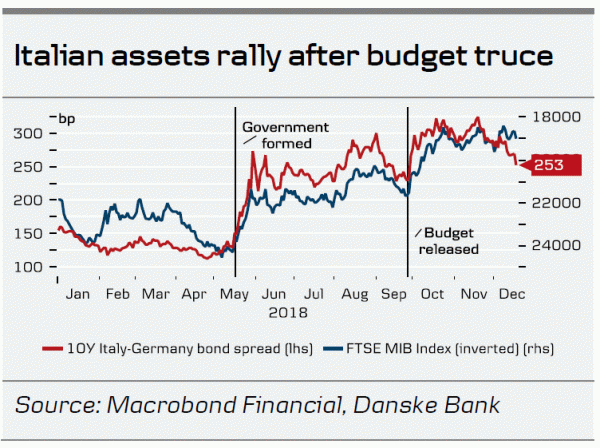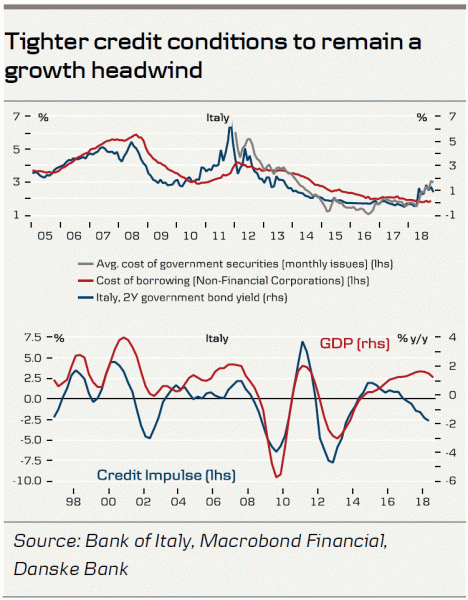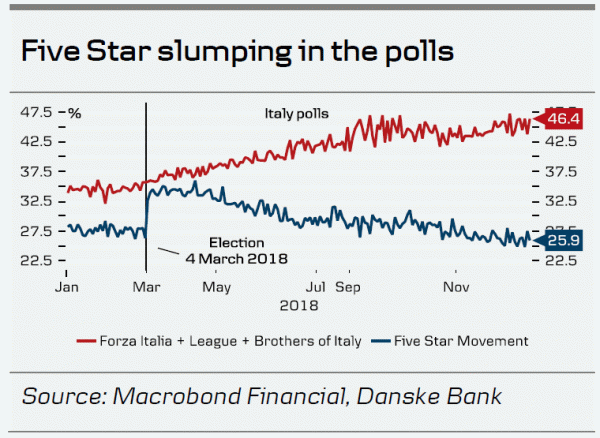In the endless Italian budget feud, the government has finally struck an agreement with the European Commission (EC) on its 2019 budget. After lengthy negotiations, the two sides have agreed on a deficit target of 2.04% (from 2.4% originally), bringing the structural deviation down to zero (from a deterioration of 0.8pp previously). Underlying the budget are more realistic GDP growth assumptions, further public real estate sales and a delayed implementation of the pension reform and citizen income to March, but the fiscal effort heavily relies on the re-activation of the safeguard clauses (VAT hikes) for 2020 and 2021. Although an excessive deficit procedure (EDP) is off the table for now, the EC will continue to monitor fiscal developments in Italy and in case of deviations from the agreement, additional safeguards of EUR2bn could be activated to keep the deficit at bay. The budget is expected to face a final vote in the Italian parliament in the coming week.
We think recent changes in the wider European political landscape were a key factor behind the Commission’s budget leniency. In response to the recent Yellow Vest protest, French President Macron announced a range of income boosting measures worth EUR10bn, which could bring France’s 2019 deficit up to 3.4% and thereby be in breach of the EU’s 3% limit. Commissioner Moscovici hinted that due to the general anti-austerity mood, the EC has chosen dialogue instead of rule rigidity, but there is no doubt that Macron’s policy shift has weakened the Commission’s hand in the Italian budget fight.
The Italian budget truce should be supportive for global risk sentiment. After the news hit the wires, the Italian curve steepened and 10Y Italian yields dropped c.12bp at open, breaking through levels reached at the end of September when the budget figures were first released. With most stumbling stones – including rating decisions and the EU stand-off – now behind us, this creates more room for spread convergence between Italy and core-EU markets. However, in light of a modest rise in net supply of Italian government bonds in 2019 and less support for Italy from ECB reinvestments going forward, we think a risk premium will remain on Italian government bonds relative to core-EU bonds and it is difficult to see the 10Y spread between Italy and Germany falling back below 200bp (i.e. pre-election levels).
Although we expect Italian risks to move into the background near term, many fundamental questions remain unresolved. The Italian economy continues to ‘flirt’ with a recession and the effect of higher borrowing costs and tighter credit conditions will continue to linger as a headwind for the real economy. Structural weaknesses will remain unaddressed and even if the government’s expansionary measures can prevent a downturn, it is difficult to become too optimistic on the growth and debt outlook in light of low potential growth below 1%. Furthermore, the fact that the Italian government has eventually yielded to pressure from the EU and markets indicates that the balance of power in the ruling coalition has changed, with the League increasingly setting the agenda. With support for the Five Star Movement steadily dwindling in the polls, a strong performance by the League at the EU election in May could well heat up discussions of a snap election in H2 19, opening up the possibility of a centre-right coalition.



